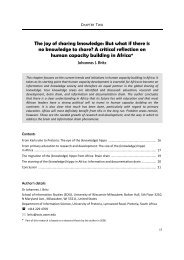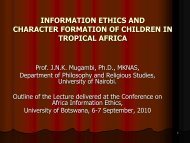<strong>Information</strong> <strong>Ethics</strong> <strong>in</strong> the <strong>Africa</strong>n Contextthis change <strong>in</strong> code will br<strong>in</strong>g about. It is to accept a cyberspace that is less free, ordifferently free, than the space it was before (Lessig, 1999:109).A free Internet can foster peace and democracy, but it can also be used for manipulation and control.For this reason, I consider it a necessity to strive for a future Internet governance regime on the basisof <strong>in</strong>tercultural deliberation, democratic values and human rights. I advocate for the expansion ofhuman rights to <strong>in</strong>clude the rights of non-human life and nature (Capurro, 2008a). The presentecological crisis is a clear sign that we have to change our lives <strong>in</strong> order to become not masters, butkeepers of our natural environment.2. <strong>Information</strong> <strong>Ethics</strong>Societal debates on ethical issues have rapidly <strong>in</strong>creased, particularly s<strong>in</strong>ce the rise of the Internet. Idef<strong>in</strong>e <strong>Information</strong> <strong>Ethics</strong> <strong>in</strong> a narrower sense as deal<strong>in</strong>g with the impact of digital ICTs on society andthe environment, as well as with ethical questions about the Internet digital <strong>in</strong>formation andcommunication media (media ethics) <strong>in</strong> particular. <strong>Information</strong> <strong>Ethics</strong>, <strong>in</strong> a broader sense, deals with<strong>in</strong>formation and communication, <strong>in</strong>clud<strong>in</strong>g, but not limited to, digital media. The ma<strong>in</strong> topics of<strong>Information</strong> <strong>Ethics</strong> are: <strong>in</strong>tellectual property, privacy, security, <strong>in</strong>formation overload, digital divide,gender discrim<strong>in</strong>ation, and censorship (Ess, 2009; Himma & Tavani, 2008). They are objects ofethical scrut<strong>in</strong>y not only on the basis of universal rights and pr<strong>in</strong>ciples, but also with regard to culturaldifferences, as well as historical and geographical s<strong>in</strong>gularities lead<strong>in</strong>g to different k<strong>in</strong>ds of theoreticalfoundations and practical options. This field of ethics is called <strong>in</strong>tercultural <strong>Information</strong> <strong>Ethics</strong>(Capurro, 2008; Capurro et al., 2007; Hongladarom & Ess, 2007; Capurro, 2006). It deals, for<strong>in</strong>stance, with the question of how human cultures can flourish <strong>in</strong> a global digital environment whileavoid<strong>in</strong>g uniformity or isolation. The idea of <strong>in</strong>tercultural <strong>Information</strong> <strong>Ethics</strong> emerged <strong>in</strong> October 2004dur<strong>in</strong>g the <strong>in</strong>ternational symposium ‘Localiz<strong>in</strong>g the Internet. Ethical Issues <strong>in</strong> Intercultural Perspective’(Capurro et al., 2007).3. PrivacyAn example of the relevance of the <strong>in</strong>tercultural approach concerns the concept of privacy fromWestern and Buddhist perspectives. While <strong>in</strong> Western cultures privacy is closely related to the self,Buddhism relies on the tenet of non-self; therefore the social perceptions, as well as the concept ofprivacy, are different (Nakada & Tamura, 2005; Capurro, 2005; Capurro et al., 2013). However, ajustification of privacy from a Buddhist perspective, based on the concept of compassion, seemspossible and plausible (Hongladarom, 2007).4. SurveillanceDigital surveillance of public spaces is supposed to ensure safety and security fac<strong>in</strong>g un<strong>in</strong>tentional or<strong>in</strong>tentional dangers, for <strong>in</strong>stance from crim<strong>in</strong>al or terrorist attacks. But, at the same time, it threatensthe autonomy, anonymity and trust that build the basis of democratic societies. New technologiesallow<strong>in</strong>g the track<strong>in</strong>g of <strong>in</strong>dividuals through Radio-frequency Identification (RFID) (or ICT implants aresimilarly ambiguous with regard to the implicit dangers and benefits, therefore they need specialscrut<strong>in</strong>y and monitor<strong>in</strong>g (ETICA, 2011; ETHICBOTS, 2008; EGE, 2005 and 2012).5. RoboticsRecent advances <strong>in</strong> robotics show a wide range of applications <strong>in</strong> everyday lives beyond theirPage 9
R. Capurro<strong>in</strong>dustrial and military applications. Robots are mirrors of ourselves. What concepts of sociality areconceptualised and <strong>in</strong>stantiated by robotics? An <strong>in</strong>tercultural ethical dialogue – beyond the question ofa code of ethics to become part of robots to make them ‘moral mach<strong>in</strong>es’ (Wallach & Allen, 2009) –on human-robot <strong>in</strong>teraction is still <strong>in</strong> its <strong>in</strong>fancy (Capurro & Nagenborg, 2009).6. <strong>Information</strong> overloadThe issue of <strong>in</strong>formation overload has a major impact <strong>in</strong> the everyday lives of millions of people(Capurro, 2005b). We lack a systematic pathology of the <strong>in</strong>formation society (Capurro, 2012).Similarly, the question of Internet addiction, particularly <strong>in</strong> young generations, is worrisome. Forexample, there is a grow<strong>in</strong>g need for cell-phone-free times and places, <strong>in</strong> order to protect ourselvesfrom the necessity of be<strong>in</strong>g permanently available.7. Digital divideThe so-called digital divide should not be considered just a problem of technical access to theInternet, but an issue of how people can better manage their lives us<strong>in</strong>g new <strong>in</strong>teractive digital mediawhile avoid<strong>in</strong>g the dangers of cultural exploitation, homogenisation, colonialism, and discrim<strong>in</strong>ation.Individuals, as well as societies, must become aware of different k<strong>in</strong>ds of ‘assemblages’ betweentraditional and digital media, to be able to relate them to their needs, <strong>in</strong>terests and culturalbackgrounds (Ong & Collier, 2005; Scheule et al., 2004). The vision of an <strong>in</strong>clusive <strong>Information</strong>Society, as developed dur<strong>in</strong>g the WSIS, must be global and plural at the same time. Concepts likehybridisation or polyphony are ethical markers that should be taken <strong>in</strong>to account when envisag<strong>in</strong>gnew possibilities of freedom and peace <strong>in</strong> a world shaped more and more by digital technology.8. Electronic wasteElectronic waste (e-Waste) has become a major issue of digital ethics (Feilhauer & Zehle, 2009). Itdeals with the disposal and recycl<strong>in</strong>g of all k<strong>in</strong>ds of ICT devices that already, today, have devastat<strong>in</strong>gconsequences on humans and the environment, particularly when exported to Third World countries.Issues of susta<strong>in</strong>ability and global justice should be urgently addressed, together with theopportunities offered by the same media to promote better shelter, reduce hunger and combatdiseases.The ethical reflection on these issues belongs to a theory on the art of liv<strong>in</strong>g, follow<strong>in</strong>g somepaths of thought by the French philosopher Michel Foucault, who dist<strong>in</strong>guishes the follow<strong>in</strong>g k<strong>in</strong>ds oftechnologies: ‘technologies of production, which permit us to produce, transform, or manipulateth<strong>in</strong>gs, technologies of sign systems, which permit us to use signs, mean<strong>in</strong>gs, symbols, orsignifications, technologies of power which determ<strong>in</strong>e the conduct of <strong>in</strong>dividuals and submit them tocerta<strong>in</strong> ends or dom<strong>in</strong>ation, an objectivis<strong>in</strong>g of the subject’, and ‘technologies of the self, which permit<strong>in</strong>dividuals to effect by their own means or with the help of others a certa<strong>in</strong> number of operations ontheir own bodies and souls, thoughts, conduct, and way of be<strong>in</strong>g, so as to transform themselves <strong>in</strong>order to atta<strong>in</strong> a certa<strong>in</strong> state of happ<strong>in</strong>ess, purity, wisdom, perfection, or immortality’ (Foucault,1988:18). How can we ensure that the benefits of <strong>in</strong>formation technology are not only distributedequitably, but that they can also be used by the people to shape their own lives? (Capurro, 2005a).In a report on Be<strong>in</strong>g Human: Human-computer <strong>in</strong>teraction <strong>in</strong> the year 2020, the result of ameet<strong>in</strong>g organised by Microsoft Research <strong>in</strong> 2007, the editors write:The new technologies allow new forms of control or decentralisation, encourag<strong>in</strong>g someforms of social <strong>in</strong>teraction at the expense of others, and promot<strong>in</strong>g certa<strong>in</strong> values whiledismiss<strong>in</strong>g alternatives. For <strong>in</strong>stance, the iPod can be seen as a device for urbanPage 10
- Page 1 and 2: Information Ethics in Africa: Cross
- Page 4: Information Ethics in Africa:Cross-
- Page 7 and 8: Page ii
- Page 9 and 10: Page iv
- Page 11 and 12: About the AuthorsDennis N. Ocholla
- Page 13 and 14: J.J. Britzmeaning of the ethical co
- Page 15 and 16: J.J. Britzright is not only on the
- Page 17 and 18: J.J. BritzFreeman, C. & Louca, F. (
- Page 19: R. Capurroprotection should be acco
- Page 23 and 24: R. Capurrocommon world instead of m
- Page 25 and 26: R. Capurroterminology (Wiredu, 1995
- Page 27 and 28: R. CapurroICT in Africa includes al
- Page 29 and 30: R. CapurroBuchmann, J. (Ed.) (2012)
- Page 31 and 32: R. CapurroRoosevelt, E. (1958). In
- Page 33 and 34: D.N. Ochollatheoretical views on th
- Page 35 and 36: D.N. Ochollaof GDP per capita are (
- Page 37 and 38: D.N. Ochollaassociate IK with tradi
- Page 39 and 40: D.N. Ochollafulfil the ideals as sp
- Page 41 and 42: S.M. MutulaBy definition, Informati
- Page 43 and 44: S.M. Mutulasurpassing countries in
- Page 45 and 46: S.M. MutulaThe University of Manito
- Page 47 and 48: S.M. Mutula8. Gaps in social media
- Page 49 and 50: S.M. Mutulaadhering to policies and
- Page 51 and 52: S.M. MutulaIt was found that cultur
- Page 53 and 54: S.M. MutulaVelasquez, M., Andre, C.
- Page 55 and 56: D. KawooyaLikewise, the laws and re
- Page 57 and 58: D. Kawooya107) but slowly making it
- Page 59 and 60: D. Kawooya4. IP in Africa and ethic
- Page 61 and 62: D. Kawooyawrongdoing because of the
- Page 63 and 64: D. Kawooyapractices. Countries that
- Page 65 and 66: D. KawooyaOf course, at the core of
- Page 67 and 68: D. Kawooyanumber of information acc
- Page 69 and 70: Page 58
- Page 71 and 72:
S.M. Mutulaparties and civil societ
- Page 73 and 74:
S.M. Mutulaadoption of the principl
- Page 75 and 76:
S.M. Mutulaset of 17 barriers for e
- Page 77 and 78:
S.M. Mutulaavailing tender document
- Page 79 and 80:
S.M. MutulaReferencesAkther, M.S.,
- Page 81 and 82:
Page 70
- Page 83 and 84:
J.J. Britzalso to benefit from it t
- Page 85 and 86:
J.J. Britzthe public sphere, which
- Page 87 and 88:
J.J. Britzinfrastructure, developme
- Page 89 and 90:
J.J. Britz6.2. Qualitative indicato
- Page 91 and 92:
J.J. BritzSen, A. (1993). Capabilit
- Page 93 and 94:
IndexCapurro 1, 3, 4, 7, 11, 12, 21
- Page 95 and 96:
IndexFFacebook 30, 33fairness 2femi
- Page 97 and 98:
IndexITU World Telecommunication 27
- Page 99 and 100:
Indexrecognition algorithms 11recon
- Page 101:
IndexYYoruba 49YouTube 30ZZimbabwe






